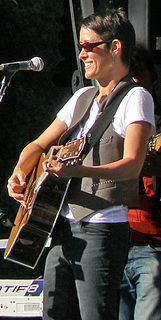A Quote by William Faulkner
He thought that it was loneliness which he was trying to escape and not himself. But the street ran on: catlike, one place was the same as another to him. But in none of them could he be quiet. But the street ran on in its moods and phases, always empty: he might have seen himself as in numberless avatars, in silence, doomed with motion, driven by the courage of flagged and spurred despair; by the despair of courage whose opportunities had to be flagged and spurred.
Related Quotes
He ran as he'd never run before, with neither hope nor despair. He ran because the world was divided into opposites and his side had already been chosen for him, his only choice being whether or not to play his part with heart and courage. He ran because fate had placed him in a position of responsibility and he had accepted the burden. He ran because his self-respect required it. He ran because he loved his friends and this was the only thing he could do to end the madness that was killing and maiming them.
What is courage? This courage will not be the opposite of despair. We shall often be faced with despair, as indeed every sensitive person has been during the last several decades in this country. Hence Kierkegaard and Nietzsche and Camus and Sartre have proclaimed that courage is not the absence of despair; it is, rather, the capacity to move ahead in spite of despair.
It requires courage not to surrender oneself to the ingenious or compassionate counsels of despair that would induce a man to eliminate himself from the ranks of the living; but it does not follow from this that every huckster who is fattened and nourished in self-confidence has more courage than the man who yielded to despair.
An individual in despair despairs over something. . . . In despairing over something, he really despair[s] over himself, and now he wants to get rid of himself. Consequently, to despair over something is still not despair proper. . . . To despair over oneself, in despair to will to be rid of oneself-this is the formula for all despair.
The country is in deep trouble. We've forgotten that a rich life consists fundamentally of serving others, trying to leave the world a little better than you found it. We need the courage to question the powers that be, the courage to be impatient with evil and patient with people, the courage to fight for social justice. In many instances we will be stepping out on nothing, and just hoping to land on something. But that's the struggle. To live is to wrestle with despair, yet never allow despair to have the last word.
Compared with the person who is conscious of his despair, the despairing individual who is ignorant of his despair is simply a negativity further away from the truth and deliverance. . . . Yet ignorance is so far from breaking the despair or changing despair to nondespairing that it can in fact be the most dangerous form of despair. . . . An individual is furthest from being conscious of himself as spirit when he is ignorant of being in despair. But precisely this-not to be conscious of oneself as spirit-is despair, which is spiritlessness. . . .
There was a man that hated his footprints and his shadow, so one day he thought that if he ran fast enough, his footprints and shadow would not be able to follow him and then he never ever had to look at them again. He ran and he ran as fast as he could, but the shadow and the footprints had no problems keeping up to him. And he ran even faster and all of a sudden he fell dead to the ground. But if he been standing still there hadn't been any footprints and if he had been resting under a tree his shadow had been swallowed of the trees shadow.
Perhaps it would have been possible to see in him a new Prometheus...the hero who for the good of mankind exposes himself to the agonies of the damned...undaunted by failure, by an unceasing effort of courage holding despair at bay, doggedly persistent in the face of self-doubt, which is the artist's bitterest enemy.
The city might be savage, stray dogs might share the streets with grimy urchins whose blank eyes reflected the knowledge that they might soon be covered over, blinded forever, by the same two pennies just begged from some gentleman, and no one in the fuming, fulminous boulevards of trade might know who actually ran Ambergris-or, if anyone ran it at all, but, like a renegade clock, it ran on and wound itself heedless, empowered by the insane weight of its own inertia, the weight of its own citizenry.
Shakespeare was an intellectual ocean, whose waves touched all the shores of thought; within which were all the tides and waves of destiny and will; over which swept all the storms of fate, ambition and revenge; upon which fell the gloom and darkness of despair and death and all the sunlight of content and love, and within which was the inverted sky lit with the eternal stars -- an intellectual ocean -- toward which all rivers ran, and from which now the isles and continents of thought receive their dew and rain.

































